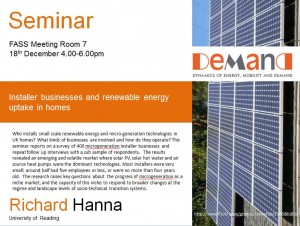 Richard talked about his PhD research into the world of small businesses involved in installing solar panels, heat pumps and other forms of microgeneration. We learned about rapid developments in the installer world: the crazy rush up to the point when the feed in tariff changed, and the ebb and flow of contractors from plumbing and electrical work into, and then back out of the more specialist field of installing micro generation technologies that qualify for various subsidies. Policy ambitions (and subsidies) have effect through of a web of business relations – including processes of inspection and certification; intermediaries who distribute products and components; product manufacturers (of which there was an impressively long list, including multi-national companies), and installers – most of whom worked locally to avoid travel costs, and problems of being called back for maintenance/repair. Not surprisingly, there were important differences in who was and was not involved in installing specific technologies (e.g. solar pv or heat pumps), each of which link more and less well with existing trades/experience. More broadly there were some interesting issues for DEMAND, especially about how ‘new’ markets and business models are made, about how small scale infrastructural renewal/diffusion goes on.
Richard talked about his PhD research into the world of small businesses involved in installing solar panels, heat pumps and other forms of microgeneration. We learned about rapid developments in the installer world: the crazy rush up to the point when the feed in tariff changed, and the ebb and flow of contractors from plumbing and electrical work into, and then back out of the more specialist field of installing micro generation technologies that qualify for various subsidies. Policy ambitions (and subsidies) have effect through of a web of business relations – including processes of inspection and certification; intermediaries who distribute products and components; product manufacturers (of which there was an impressively long list, including multi-national companies), and installers – most of whom worked locally to avoid travel costs, and problems of being called back for maintenance/repair. Not surprisingly, there were important differences in who was and was not involved in installing specific technologies (e.g. solar pv or heat pumps), each of which link more and less well with existing trades/experience. More broadly there were some interesting issues for DEMAND, especially about how ‘new’ markets and business models are made, about how small scale infrastructural renewal/diffusion goes on.
Understanding Demand
Influencing Demand
Policies for steering demand
Invisible energy policy
Adapting social practices
Commission on Travel Demand
How Demand Varies
Situations, Sites, Sectors
Domestic IT use
Home heating
Offices and office work
Business travel
Online shopping
Car dependence
Older people and mobile lives
Local smart grids
Cooking and cooling in Asia
Energy, Justice and Poverty

